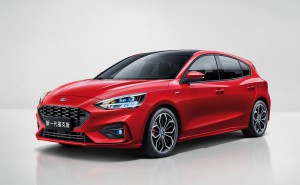
Ford killed the Focus Active after it was determined the company couldn't turn a profit on the small China-built crossover with the Trump tariffs.
One of the first steps in the shift of Ford Motor Co.’s product lineup from cars to trucks, sport-utes and crossovers has blown up, as the company killed the China-built Focus crossover due to the ongoing trade war between China and the U.S.
The automaker said the tariffs imposed by President Donald Trump make it impossible to make a profit on the new Focus Active crossover, which was expected to hit U.S. shores in late 2019.
“Given the negative financial impact of the new tariffs, we’ve decided not to import this vehicle from China,” said Kumar Galhotra, Ford president of North America told the Detroit News. “The significant thing that moved was the tariffs going up substantially higher. We’re choosing to deploy resources elsewhere.”
The Trump administration has already imposed duties on Chinese-made vehicles of up to 25%. Trump is considering a proposal to impose tariffs on all imported vehicles based on national security grounds. Congressional leaders in both parties have decried the plan as well as all automakers.
(Ford offers a first look of its new global Focus. Click Here for the story.)
The impact of the increased tariffs isn’t just impacting Ford. General Motors has been working to gain an exemption for its Buick Envision, which is built in China and sold there as well as the United States. The crossover accounts for about 19% of the brand’s annual sales. Thus far, the company hasn’t been able to secure an exemption from the tariffs for the vehicle.
For now, the Focus Active, which was expected to compete in the small or compact segment of vehicles priced at about $20,000, is the only Ford impacted by the tariff.
About 95% of the vehicles Ford sells in the U.S. are produced in the NAFTA region, the U.S., Canada or Mexico, Galhotra said. The current exceptions to that is the new EcoSport small sport utility from India and Transit Connect small vans from Spain.
(Ford Fiesta among three familiar models may vanish as sales shift to SUVs. Click Here for the story.)
“At the moment we do not see any significant risk to those products,” Galhotra told Reuters.

